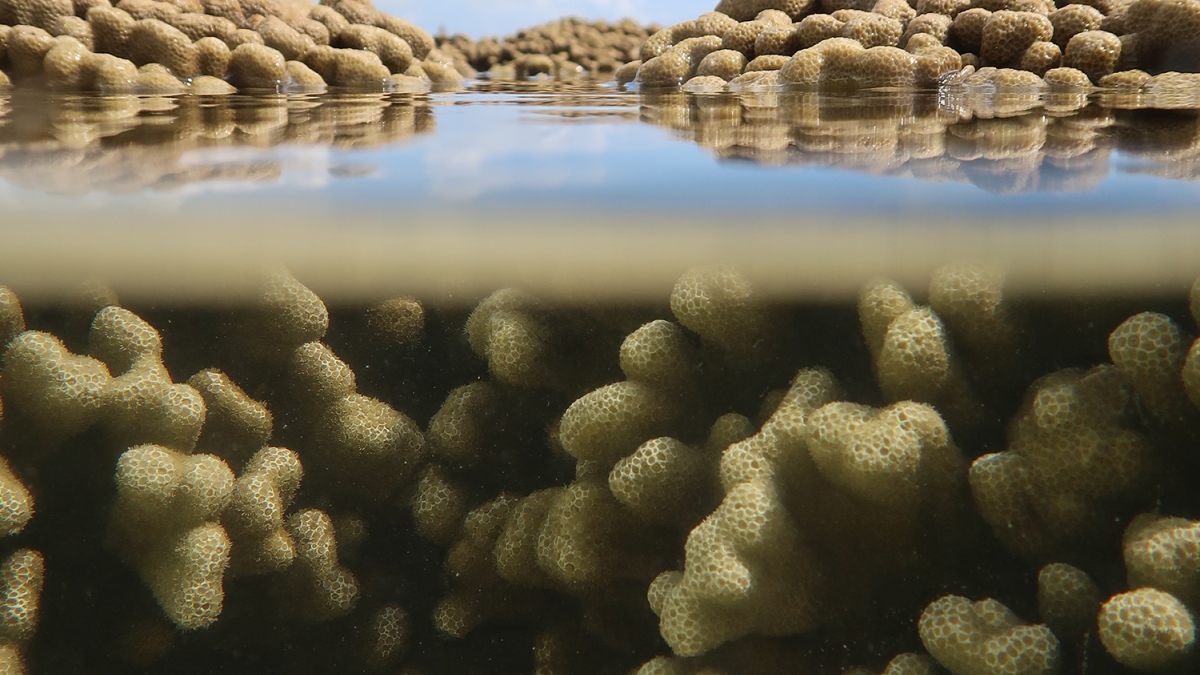School of Molecular Sciences researcher awarded $1.2M to study coral bleaching mechanisms

Intertidal corals in Hawai'i. Photo credit: Hollie Putnam
The current widespread heat wave is not only affecting life on land — it's also affecting life in the ocean.
Rising seawater temperatures across the world’s oceans are having a negative impact on marine life and the health of coral reefs, which support a biodiversity rivaling that of rainforests and contribute to a $36 billion economy benefiting over one billion people.
Liza Roger of Arizona State University’s School of Molecular Sciences, along with co-investigators Daniel Wangpraseurt of the University of California San Diego and Hollie Putnam of the University of Rhode Island, has been awarded $1.2 million over the next three years by the National Science Foundation to investigate stress in coral-algal mutualistic symbiosis dynamics.
Roger is a marine biologist and molecular scientist with a background ranging from geochemistry and biomineralization to in vitro coral cellular biology, applied chemical engineering, nanomedicine and microfluidics. Wangpraseurt is a marine biologist and bioengineer specializing in nanoengineering and 3D biofabrication for symbiosis. Putnam is a molecular eco-physiologist at the intersection of marine ecophysiology, epigenetics, symbiosis and climate change.
Environmental stressors including rising temperatures threaten coral reefs, primarily through bleaching or the breakdown in the symbiosis between coral and algae that fuels coral reef growth. Recurrent mass bleaching events recorded for the past two decades have caused significant coral mortality and left coral reefs highly degraded, making their survival uncertain past 2050.
Although the mechanism of coral bleaching is not fully understood, it is known that cellular damage occurs through several processes, including an excess of free radicals, innate immune responses and deficient antioxidant systems.
By integrating marine biology, molecular sciences, ecophysiology, nanoengineering and three-dimensional biofabrication, Roger and her co-investigators will generate a mechanistic understanding of stresses caused by free radicals in the coral-algal mutualistic relationship. The team aims to answer a long-standing and critical question about the free radical stress model of cnidarian bleaching. By considering this question in three different biological models (whole animal, cell culture and biohybrid corals), this project has the potential to tease apart the mechanisms and sources of free radical stress and its effects on the cnidarian-algal symbiosis.
“While the details of the relationship between coral host and algal symbiont are complex,” Rogers explained, “our approach will strive to understand each partner’s involvement in the accumulation of free radicals during stress on spatial scales ranging from molecules to cells and tissues to organisms, modeled in the 3D chemical landscape and architecture of reef-building corals.”
By integrating recent advances in cellular-level coral research with nanobiotechnology, Roger’s research seeks to close the gap in the understanding of molecular, cellular and microenvironmental dynamics of coral bleaching. A more complete understanding of coral-algal interactions will open new possibilities for coral reef conservation and restoration efforts.
More University news

ASU names 3 Regents Professors for 2025
Three Arizona State University professors are being honored with the highest faculty award possible — Regents Professor.The three…

Lester Godsey joins ASU as chief information security officer
With a career spanning nearly three decades of professional IT experience, Lester Godsey is back where he first started — serving…

ASU a top-ranked university for graduate employability
Editor’s note: This story is featured in the 2024 year in review.Students usually seek higher education degrees to…